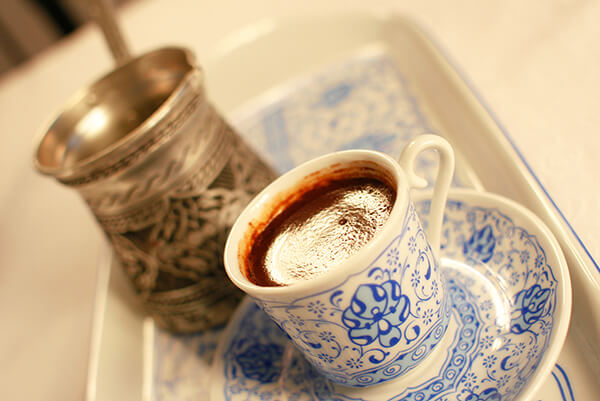Turkish coffee
Turkish coffee, which is famous all over the globe for its strong taste and unusual methods of preparation and service, is made from the arabica bean and is composed of a very fine grind.
But its great taste isn’t the only interesting thing about this coffee. And so here’s the ultimate guide to this delicious brew.
History of Turkish coffee
The story starts with two Syrian traders who bought coffee in Istanbul in 1555. And by the 17th century, it had become an important part of the intricate ceremonies of the Ottoman court. Coffee makers served the Sultan this drink ceremoniously, and this practice was also a part of marriage customs. Men would judge potential women by their skill in making Turkish coffee, and harem women were trained to brew the perfect cup. This tradition still has its echoes in the modern custom where when a women’s hand has been asked by the suitor’s family, they’re to be served Turkish coffee by her.

Turkish coffee is the best coffee
The famous coffeehouses
Five centuries ago, the first coffee house was opened in the Tahtakale neighborhood in Eminönü, soon becoming a focal point in the life of Turkish men. These places became important as centers for the dissemination of oral culture in the Ottoman Empire. They provided a stage and audience for artists, bands, comedians, and other performers, making coffee houses an exhibition of folk literature. Some of the examples of literature that became prominent through these coffeehouses are the shadow plays of Karaköz and Hacivat. This legacy of coffeehouses continues, and they remain a place for socialization over cups of coffee and tea.
How to Make Turkish Coffee
A cezve is used to prepare Turkish coffee, which is a special small pot. It has a long handle, usually made from copper. To make one cup of this coffee, you’d take one cup of water, mixing it with two teaspoons of the coffee. Sugar is not to be added after the coffee has been brewed, and thus must be added into the cezve. Sugar can be added to preference, two cubes for very sweet, one for sweet, and none for those who prefer bitter.
The foam should rise once the coffee comes to a boil, and the cezve must be taken off the heat right before the coffee spills. This will ensure that your coffee has plenty of foam, a lack of which is considered quite unacceptable by tradition. Another part of the ritual is to serve it with a glass of water and something sweet, preferably Turkish Delight.
Unesco intangible cultural heritage list
Turkish coffee became a part of UNESCO’s Intangible Cultural Heritage List in 2013. Several factors, like its special preparation, the brewing techniques, and the rich communal culture surrounding it, contributed to this achievement, along with its place in social occasions, being served during holidays and engagement ceremonies. With locals meeting at these coffee houses to talk, grow bonds, the tradition of offering coffee as a welcoming gesture has also been recognized as a symbol of hospitality and friendship.
Turkish coffee is a beneficial and healthy drink for our body.
The habit of drinking Turkish coffee helps maintain blood cholesterol levels and eliminates the possibility of stroke. We can call Turkish tea an analgesic because it accelerates pain relief. Moreover, it works effectively on the digestive system. Due to its unique antioxidant properties, Turkish tea is medicinal for many skin problems and cancers. Turkish coffee can cleanse the mind and help focus like other coffees.

Turkish coffee is good for health
But over dozing can do some harm. For example, drinking Turkish coffee more than three times a day can lead to heart disease. Therefore, heart patients should be more careful when drinking coffee than healthy people. Careless use of coffee can also lead to high blood pressure, migraines, and diseases such as migraines and ulcers. Also, drinking coffee after a meal can raise blood sugar levels in diabetic patients.
Other than that. Excessive coffee consumption can adversely affect a woman’s reproductive system, pregnancy, and lactation. Turkish coffee normally prevents the absorption of essential minerals such as iron. Therefore, like everything else, we must control the consumption of Turkish coffee.

Coffee is a delicious drink
Turkish coffee isn’t just a treat for the taste, but also your health. It can balance cholesterol levels, increase the potency of pain relievers, and is good for headaches and bone pain. It helps in the prevention of several heart ailments and is also quite good for your digestive system, like helping and correcting bowel movements.
Turkish coffee can help in preventing major problems like cancer because of the antioxidants present in it. It’s also great for skin problems, often when contacted via massage. To top that all off, Turkish coffee also increases concentration and clears the mind.
